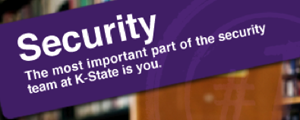An increase in thefts of laptop computers from K-State offices, labs, and classrooms over the past few months point to a need for K-State faculty, staff, and students to be more diligent about protecting their laptops and the data stored on them. Virtually every theft was opportunistic, made easy by people leaving unsecured laptops in plain sight in an office, lab, or residence hall room with the door left open.
One campus theft recorded by a video surveillance camera showed that it only took six seconds for the thief to unplug the computer and make off with the power adapter and laptop. SIX SECONDS! Fortunately in this case, the criminal was identified from the video and the laptop was recovered, but not before it was reformatted and the student’s term paper lost. We were lucky in this case, since most stolen laptops are not recovered.
We make it too easy
The vast majority of these thefts are “thefts of opportunity” that are easily prevented.
- In a case this past week, a laptop was stolen from an office when a faculty member left for just a few minutes and left the door open.
- Two others (belonging to visitors to campus) were stolen recently from an unlocked classroom being used for a continuing education workshop.
- Three others were stolen from a common student office area that was unlocked.
Continue reading “Increased laptop thefts on campus are wake-up call” →
